Bay County is working to remove a significant amount of debris that has been illegally dumped alongside Bay County roadways, particularly on Jenks and State avenues.
“Clearly some confusion exists about what constitutes ‘storm debris’ and what does not,” Bay County Public Works Director Keith Bryant said. “These illegally dumped construction materials by contractors are not just unsightly, they cause significant stormwater drainage and public safety issues.”
Along the most-affected roadways, the county will post signage warning against illegal dumping as well as cameras aimed at catching violators in the act, who will be prosecuted in accordance with Florida State Statute 403.413. Illegal commercial dumping is a felony, and residents are urged to report instances to law enforcement.
What kind of debris may be placed on the right of way?
Only storm-generated debris should be placed in the right of way. Storm-generated debris includes tree limbs, logs, and branches; loose construction materials created by the storm event; items inside the residence destroyed by the storm; broken glass; and wallboard, carpet, and other building materials damaged by the storm.
Regular household garbage should not be placed in the right of way, and should be disposed as it was pre-storm.
Items removed as part of the demolition, reconstruction, repair, or removal of a residence should be disposed by a contracted waste-service provider. Debris is eligible for placement on the right of way if the demo/reconstruction is done by the homeowner or a volunteer group.
Who can place debris on the public right of way?
Only Bay County residents may place storm debris on the public rights of way. Commercial businesses, including apartments, should arrange with their contracted waste services provider for disposal. Waste from commercial properties should not be placed on the right of way.
Bay County will not pick up debris from unimproved property or land used for agricultural purposes.
Contractors assisting with the demolition, reconstruction, repair, or removal of items from a residence are required to make arrangements for disposal of items from the property. Contractors are not permitted to dispose of debris on the right of way and should haul the debris to a landfill.
What about private roads?
Bay County will only pick up items on private roads with the permission of the owners. Residents living on private roads who want debris removed from the right of way will need to complete and return right-of-entry agreements to the county. The agreements are available for download at www.recoverbaycounty.com or by emailing [email protected]. Residents on private roads whose insurance will pay for debris removal need to arrange for disposal of debris with a contracted waste services provider.
How long will the roadside pickup continue?
Bay County will announce deadlines for residents to place materials in the right of way for removal. Those deadlines will be based on when the county’s debris-removal contractors expect to complete the second pass. Material placed on the right of way after those dates will be considered illegal dumping.
What can you do to help?
Residents are asked to ensure that contractors have arranged for the disposal of waste from the demolition, reconstruction, or repair of their homes.
Unauthorized dumping on county right-of-ways is a felony. Please report any illegal dumping to law enforcement.
Owners of commercial properties who have placed material in the right of way should arrange for its removal as soon as possible. Commercial debris not removed by Dec. 15 may be subject to law-enforcement action.
Where can I take my unwanted or damaged items?
he Bay County Solid Waste Division operates two solid waste disposal/processing facilities, the Bay County Waste-to-Energy Facility and the Bay County Steelfield Road Landfill. Both are open to the public. Residents are encouraged to take their unwanted items to either of the locations. For more information on these facilities, please visit Bay County’s website.

